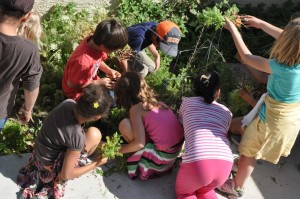
An integral part of the Montessori cultural curriculum is cultivating an appreciation for the complexity of the earth’s ecosystem and the value to the whole of each part. In gardening, younger children dig, plant, and water, learning about plants’ life cycle and their need for water, soil, and sunshine. Older children learn about composting, plant identification, photosynthesis, and more. As children care for plants and experience the contributions of plants to their lives, they learn about interdependence. As each child grows, he or she gradually begins to see him/herself as making their own valuable contributions to their family and community.
In addition, to building self-awareness and scientific knowledge of the physical and biological world, gardening also builds character traits – patience, careful observation, mutual respect, cooperation, confidence, and joy in the natural world. Through gardening, children gain an appreciation for the importance of each stage of growth. In gardening, students prepare soil, plant seeds, tend sprouts, and harvest healthy vegetables that are then prepared and served for all to enjoy. Students learn to use gardening tools like shovels, rakes, and soil thermometers. Students connect to the earth, to themselves, and to their bodies. Eating vegetables that they’ve grown themselves, they also begin to learn about good nutrition. Of course, digging, pulling weeds, and turning compost, students also relish fresh air, exercise, collaboration, and enjoying the “fruits” of their labor.
